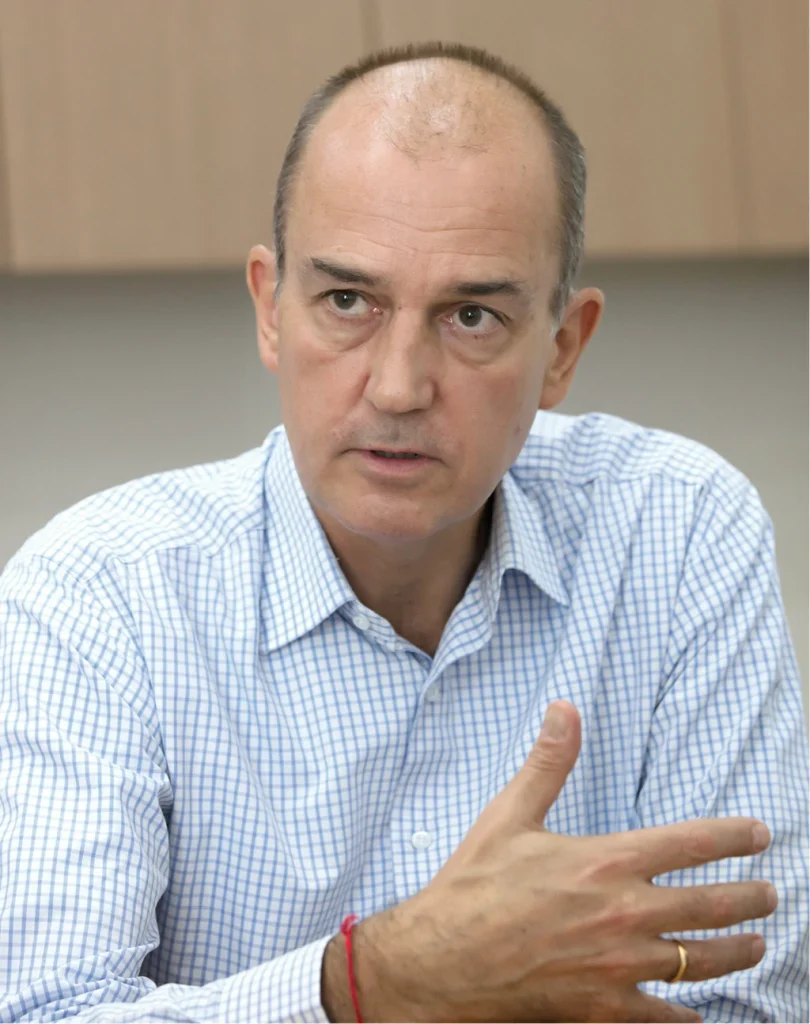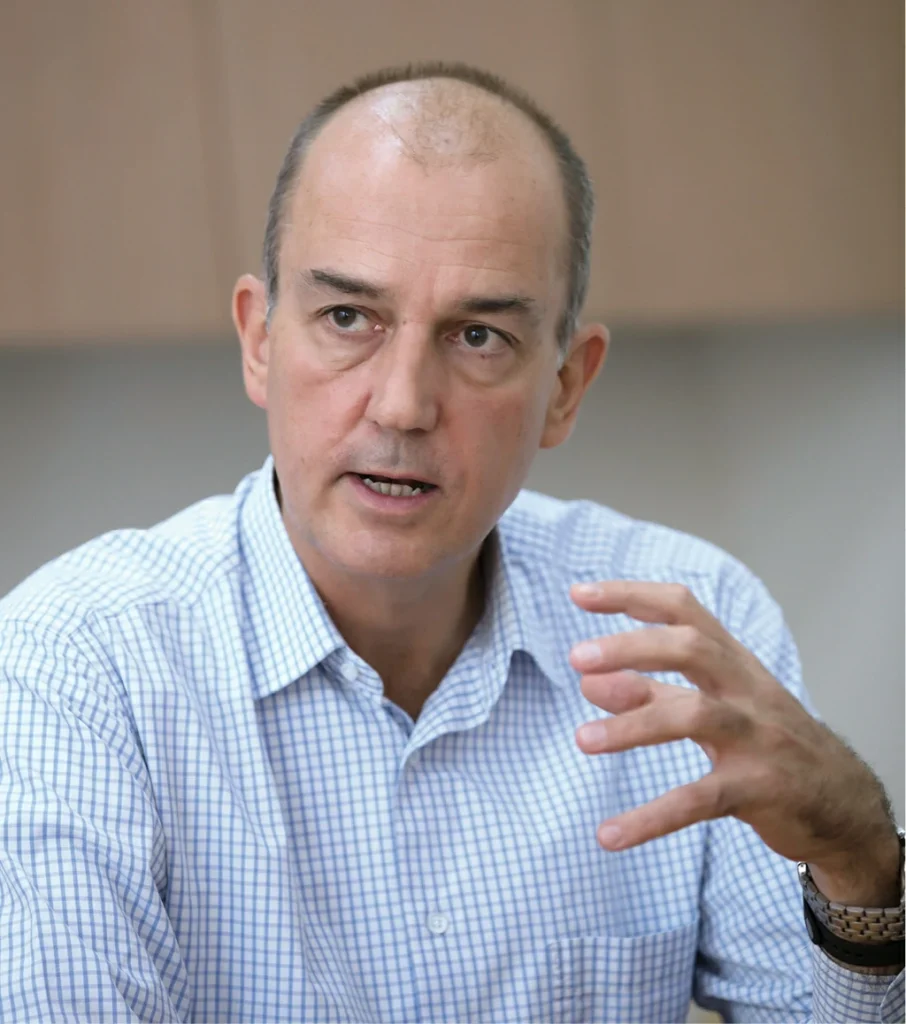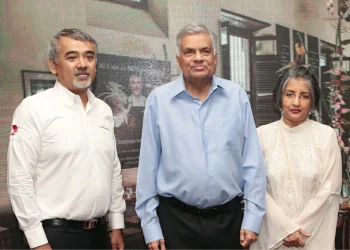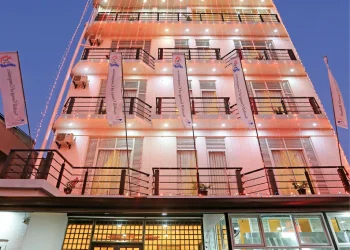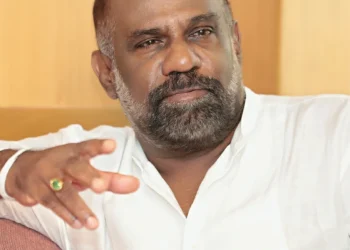
While Shangri-La’s Hambantota Resort & Spa begins to gather momentum, Shangri-La Hotel Colombo is nearing completion and is set to be a benchmark in the industry. Timothy Wright, Vice President (Sri Lanka & India) and General Manager, Shangri-La Hotel Colombo speaks about the confidence that the global brand has in its properties in Sri Lanka.
By Udeshi Amarasinghe. Assisted by Yomal Senerath-Yapa | Photography Mahesh Bandara
Shangri-La’s Hambantota Resort and Spa is the first property of the group to open in Sri Lanka. What has been the response so far?
The initial response was overwhelming. We received massive support from the Sri Lankan market. Many people were interested in seeing this new property that we had built. We are now starting to attract interest from further afield; such as from countries like Middle East, India, and Europe. The feedback we received was overwhelmingly positive, particularly about the facilities that we offer.
In terms of service and food we have some fine tuning to do. But I am confident because we are making improvements everyday, and we are happy with the manner in which the resort is performing.
Shangri-La Hambantota is also the first resort in the country to have its own golf course. What can you tell us about this?
We have designed the golf course with a number of man-made lakes and this helps us during the dry periods of the year. The golf course, while it took some time to complete landscaping and for the grass and the greens to establish, after 9 months, I must say that the quality of the golf course is at a very high standard. I believe it will soon be Sri Lanka’s leading golf course. The standard of the grass, maintenance and also the attractiveness of the course is going to make it very popular. I used to manage one of our properties in Malaysia, which was an extensive resort. This also had a golf course, and it proved to be quite a popular addition to the facilities. The thought process behind building the golf course was twofold: one, to attract golf enthusiasts from overseas. But it was equally important to offer our very own Sri Lankan golfers another opportunity to play golf. At the moment Sri Lanka is still developing as a golf destination. We hope to add our experience and expertise in developing the golf market in Sri Lanka.
The Initial Response Was Overwhelming. We Received Massive Support From The Sri Lankan Market. Many People Were Interested In Seeing This New Property That We Had Built.
What about the children’s zone?
We always know that we have achieved results when our younger guests don’t want to go home. Speaking to clients and guests with children who have stayed at the resort, they have had a wonderful experience because the younger guests are engaged in activities. Nowadays children spend most of their time in front of computers, or watching television. Our objective is to engage them with activities that provide them with an experience. We have the trapeze, trampoline, children’s swimming pool and various other activities that have been organised by our strongly focused recreation team. It is all about finding interesting things for younger guests.
Shangri-La is the first international chain to enter Hambantota, which is not really a tourist area. What was the strategy behind this?
The owners of the Shangri-La are always looking at opportunities where there is future developments and accessibility. They felt that Hambantota was going to be developed soon. We have seen a certain degree of infrastructure development there and we hope that this will continue. Many of the renowned, or the well-established tourist destinations, such as Galle and Kandy are fairly well established and are probably reaching its maximum capacity. We wanted to enter an area where we could contri-bute in development and today we are starting to see other resorts opening in that location. Therefore, I am confident that Hambantota will become a far more established destination.
Everyone is waiting for Shangri-La Colombo to be completed and opened. Can you tell us about the progress so far?
The fact that our office has moved into the hotel says a fair amount about our confidence that progress is in line with our expectations. We are aiming to open it in the last quarter of this year. The exact date is yet to be determ-ined. The reason is not necessarily because of lack of progress due to inefficient workers or delays; but it is more about fine-tuning the ultimate product as we go along. This means that at times the original plan may need to be slightly adjusted but progress is good. We have a team of project managers, both from the side of the contractor and from Shangri-La who are closely monitoring the progress. We are also starting to hire people for our staff and again, this is not going to happen until we are fairly confident about the time of opening.
What can we expect from Shangri-La Hotel Colombo?
Certainly, from a product perspective I would say that one of the key features of Shangri-La Colombo will be the expansive function and event space. We will have the biggest ballroom in a hotel in Sri Lanka and a number of other meeting rooms and meeting spaces, including an outdoor lawn up on the 4th floor. We are looking at providing spaces that will suit not only business but also social events. We will creatively combine that with a very international team of culinary and service personnel so that we are able to cater to many different tastes and occasions. Our F&B outlets will be innovative and quite interesting, and our room product will be the characteristic Shangri-La elegance with a host of facilities. To support that we intend to hire the best possible people, so that we have warm and friendly Sri Lankan hospitality from the Shangri-La brand.
We Wanted To Enter An Area Where We Could Contribute In Development And Today We Are Starting To See Other Resorts Opening In That Location.
Can you tell us about the positioning of the properties in Sri Lanka and your target market?
We do hope that the two new Shangri-La properties here will complement each other. In Sri Lanka, particularly the leisure market, tourists generally spend a very short time in Colombo and spend a week touring various popular locations in the country. Once Colombo is established, I believe there will be tremendous opportunities in targeting guests who want to explore the city and then perhaps go for a more relaxing beach destination. Within Colombo itself the market will be similar to that of Hambantota. There will be a strong segment from the Sri Lankan community, predominantly in food and beverage as well as events. Both our properties are targeting such countries as India, China, the Middle East and Europe. We see India as a big potential. We have already hosted two Indian weddings in Hambantota and we are beginning to see interest in Colombo from that same segment.
Shangri-La has properties around the world, what was the strategy in selecting Sri Lanka?
Many of the decisions to invest are related to perhaps business contacts or other parts of our business that introduce us to contacts in a new destination like Sri Lanka. The previous government and the current government have and are working very hard to create a positive environment in which investors feel confident to invest large sums of money – both in the short term and long term. We have been given the confidence that we will get returns on our investment and that Sri Lanka is a sound place to invest in.
The Chinese and Indian markets are growing significantly. Will Shangri-La give greater focus to these markets?
Yes, it is not only for the Chinese or Indian markets; we look at the needs of the traveller, whether it is in terms of culinary requirements or language. In Hambantota we have an Indian chef and we already understand some of the culinary requirements, and we also have Indian staff on our team. We have a chef who is quite knowledgeable in Chinese cuisine, and have number of Chinese speakers on our staff. We will be doing similar things in Colombo. Some of these markets have very different culinary needs. Food is very important for everyone and if the hotel cannot get what you are used to or comfortable with, then your tolerance levels are very short. It is very important for us to try and understand the needs of these travellers as well as the markets. The objective is to make the guest comfortable. They want to experience Sri Lanka. They want to experience the local culture, but also feel comfortable. Sometimes those home comforts are very important.
What will Shangri-La bring to the Sri Lankan hospitality sector?
Our commitment and our people. We have many Sri Lankans working for us overseas and many have expressed their interest to return to Sri Lanka. They are proud to work for Shangri-La, and they are quite proud to be Sri Lankan. We saw some of them come back for Shangri-La Hambantota. There is a lot of interest from our colleagues working overseas who are also very enthusiastic to be a part of the grand opening of Shangri-La, Colombo. As you know, we are a global organisation, we invest in our people, however we also embrace the local culture. We are not going to bring Chinese or Malaysian or Singapore hospitality to Sri Lanka. We will be bringing our processes, our expertise and our own experience. But ultimately we want Sri Lanka to be proud of their Shangri-La in Colombo and their Shangri-La in Hambantota.
Can you elaborate on the philosophy and values of Shangri-La and how these have been translated into the properties in Sri Lanka?
The values of our company are very similar to those values of Sri Lankans. That is why I think it has been a very easy transition. The essential elements of respect, of courtesy, of helpfulness, of selflessness; many of these values are natural to the Sri Lankan culture, as they are in other parts of Asia as well. The transition that we saw in Hambantota and what I am experiencing with my team that are growing here in Colombo, is that there is a natural affinity to those values. Yes, we will bring our experience and our knowledge of working in different countries; but I think in many occasions it is the very strong affinity and bond between the values that we behold as vital and the values that are important to Sri Lankans in general that will ultimately make the difference.
We Will Be Bringing Our Processes, Our Expertise And Our Own Experience. But Ultimately We Want Sri Lanka To Be Proud Of Their Shangri-La In Colombo And Their Shangri-La In Hambantota.
What are your thoughts on the hospitality and tourism sector in Sri Lanka? What more can be done to develop this sector?
With international brands coming into Sri Lanka, they will bring in their marketing connections and distribution, which will help boost Sri Lanka’s reputation in the world as a destination. For many years Sri Lanka had attracted, perhaps, a more budget-conscious traveller. But today the country is back on the bucket list of many international travellers. We have also seen a huge interest in investments. I believe the fact that with international brands coming in, there are new investments: this generates confidence in the destination. That is one reason why I feel that this sector will continue to grow. Some of the concerns that many of my industry colleagues have is, do we have a robust marketing plan? Do we have a clear strategy? Are we going to go out and really develop the markets? There is some doubt as to whether the sector has that strength and determination.
What about human resources?
Most industry colleagues tell me that this is the most challenging aspect. I hope that I have some advantage because during the last three years I worked in an HR role in our corporate office in Hong Kong. I believe that as we focus at attracting, training and retaining our people; if we focus and realise that what makes the difference is the people, our key asset, I do not anticipate it to be too difficult.
We are looking at ways of giving back to the community. We are providing sponsorships to students. In Hambantota we sent 50 people from that local community to Shangri-La properties all over the world for training for a period of three years. That is a big investment and commitment to develop people. However, if we attract the right people, look after them and constantly motivate and train them, I do not anticipate many problems.
There are many other international chains opening properties in Colombo, what can you tell us about this?
That is great; this will increase the focus and opportunities to promote the destination. The international companies will bring in their own distribution channels, connections and sales offices around the world, which can only be a positive for Colombo. From a market perspective, there will be questions such as “Will there be sufficient demand for all these hotels to be profitable? Where are we going to get the people to manage these properties?” But I feel that this is where the industry and the Government really need to start thinking about a strategic plan for human resources and for marketing the country. However, I believe it is positive.
From A Market Perspective, There Will Be Questions Such As “Will There Be Sufficient Demand For All These Hotels To Be Profitable? Where Are We Going To Get The People To Manage These Properties?” But I Feel That This Is Where The Industry And The Government Really Need To Start Thinking About A Strategic Plan For Human Resources And For Marketing The Country.
Sri Lanka is expecting a large influx of tourists. What more needs to be done to attract tourists to Sri Lanka?
If we look at Colombo in particular, there are many interesting attractions but they are not packaged properly. The leisure as well as the business traveller would want to explore, learn about the culture and the history of the country but the manner in which these are packaged does not maximize the opportunities available. This is an area I wish to work with our colleagues. How can all of us improve the experience of the traveller, whether he is on business or leisure? We want them to share the interesting aspects of Sri Lanka with others. Many people talk about having water parks and other such attractions but for me the beauty of Sri Lanka is that, many places are untouched. There is pristine nature and you are able to interact with communities that lead a simple life, and this is what I find very appealing.
Is Sri Lanka targeting the right tourist?
Good question. During the last 30 years this country attracted the adventurous. The country was off the beaten track for many people. I think it was attracting the adven-turous who tended to be budget conscious, who look for experiences that are very natural and therefore at quite a low cost. We need to really establish Sri Lanka as a destination that also meets the needs of the more discerning, and conventional traveller who wants a very comfortable bed, a warm and friendly service, good facilities and a variety of food. This would be slightly up market. I am seeing many boutique hotels and boutique resorts, which are quickly becoming more and more attractive to the regular business traveller and the leisure traveller.
We are in fact starting to see the influence of Cinnamon, Taj, Kingsbury, Galadari, plus international brands. We see the standards have raised and I have a lot of respect for Sri Lankan hotels, and all the local brands have done a fantastic job under very difficult conditions. But I do hope that some of the newcomers who are coming into the market will influence them to work a bit harder both for their customers and for their people.
You are also in-charge of the Shangri-La properties in India. What can you tell us about this?
There are many opportunities for Indian travellers in Sri Lanka. It is a huge market. We currently only have two properties in India, and we are looking at opportunities to expand – because from North to South, East to West, the regions are all so different. There is a lot of interest from the Indian market for Sri Lanka. Similarly, there are many opportunities for those Sri Lankans within India as well. I see a natural synergy between the two countries: in business, trade and leisure. We are very positive about the feedback we received from our Indian partners.
You are based in Sri Lanka, though in charge of two markets. Generally most would be based in India. What was the thinking behind operating from Colombo?
The two properties we manage in India are comparatively smaller, whereas the two properties in Sri Lanka, we are the majority investor. Therefore, it makes sense that our location and our centre should be in Colombo, although frequently it is the other way round. Having said that, this does not mean that we do not care about India or we do not think it is important. It is certainly an opportunity, with my proximity to India, to really spend more time trying to understand the market, looking at opportunities and trying to improve the synergy between our businesses in India and Sri Lanka.
Our Owners, Our Investors And Our Shareholders Have Put In A Tremendous Amount Of Money, Because They Have Much Faith In The Country’s Economy And In The People.
Can you tell us about yourself and your career experience?
I was born in the region and spent my childhood overseas. I joined the hotel industry as I enjoy working with people. I love travelling and wanted to continue the journey that my parents gave me of experiencing different cultures. I joined the Shangri-La group 23 years ago and had the opportunity to work in nine different countries and 11 different hotels. I found this experience very interesting. I feel fortunate I had the opportunity to experience different cultures.
I was in HR in my previous role, and one of my responsibilities was coordinating General Manager Assignments for our properties. I immediately fell in love with Sri Lanka when visiting the country last April, to check on the pre-opening of Hambantota. Back in Hong Kong I said to my CEO, “If there is any chance to go to Sri Lanka, I would like that opportunity”. I have been very fortunate.
How does Sri Lanka differ and what has been your experience so far of the country?
Every single country has its own culture. I do see many similarities to Southeast Asia and India. But there are big differences as well. Sri Lanka as well as its people have been through so many great difficulties during the last 30 years, which has made them very resilient and tolerant. I am new here; I am just a beginner in Sri Lanka. But still, just to see the synergy and cohesiveness between the different faiths and cultures in Sri Lanka has been very heart warming indeed.
I feel very privileged to be here and I say that sincerely. I am very lucky when it comes to the people I work with. We will of course have challenges, which is natural, but I am confident that we are putting together the best possible team, and I also hope that we will be making an impact with our beautiful property. Our owners, our investors and our shareholders have put in a tremendous amount of money, because they have much faith in the country’s economy and in the people.
